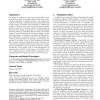Free Online Productivity Tools
i2Speak
i2Symbol
i2OCR
iTex2Img
iWeb2Print
iWeb2Shot
i2Type
iPdf2Split
iPdf2Merge
i2Bopomofo
i2Arabic
i2Style
i2Image
i2PDF
iLatex2Rtf
Sci2ools
118
click to vote
DIALM
2010
ACM
2010
ACM
Prioritized gossip in vehicular networks
We present a method for using real world mobility traces to identify tractable theoretical models for the study of distributed algorithms in mobile networks. We validate the method by deriving a vehicular ad hoc network model from a large corpus of position data generated by Boston-area taxicabs. Unlike previous work, our model does not assume global connectivity or eventual stability; it instead assumes only that some subset of processes are connected through transient paths (e.g., paths that exist over time). We use this model to study the problem of prioritized gossip, in which processes attempt to disseminate messages of different priority. Specifically, we present CabChat, a distributed prioritized gossip algorithm that leverages an interesting connection to the classic Tower of Hanoi problem to schedule the broadcast of packets of different priorities. Whereas previous studies of gossip leverage strong connectivity or stabilization assumptions to prove the time complexity of glo...
Related Content
| Added | 10 Feb 2011 |
| Updated | 10 Feb 2011 |
| Type | Journal |
| Year | 2010 |
| Where | DIALM |
| Authors | Alejandro Cornejo, Calvin C. Newport |
Comments (0)

